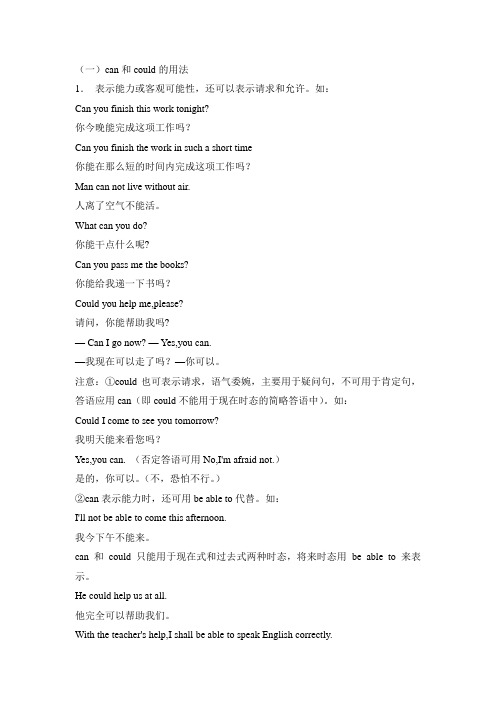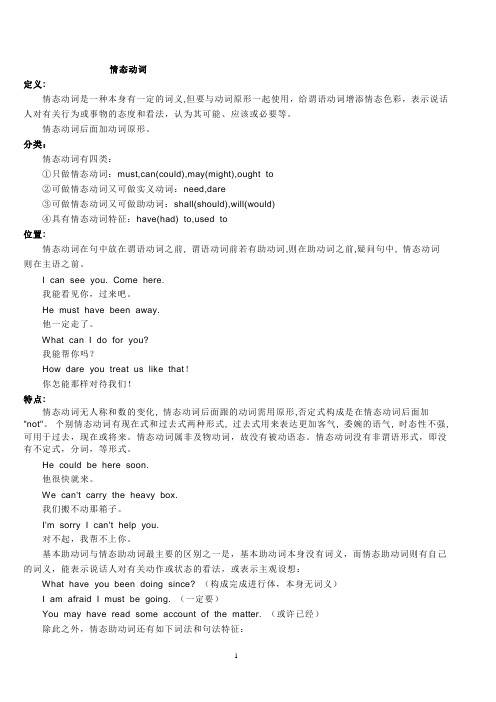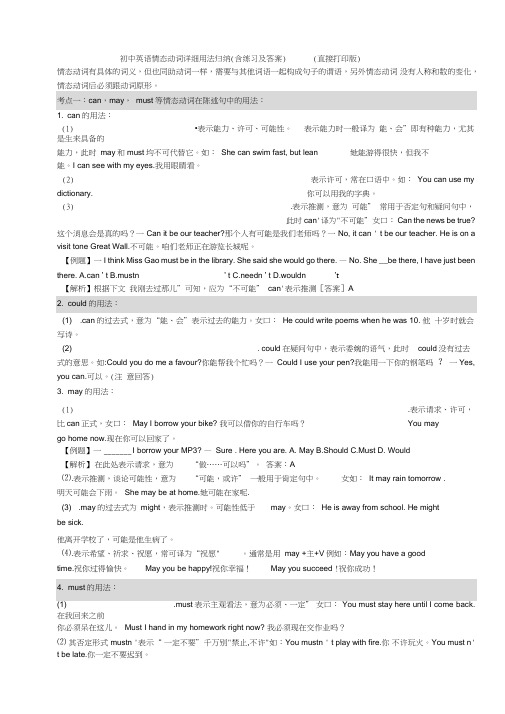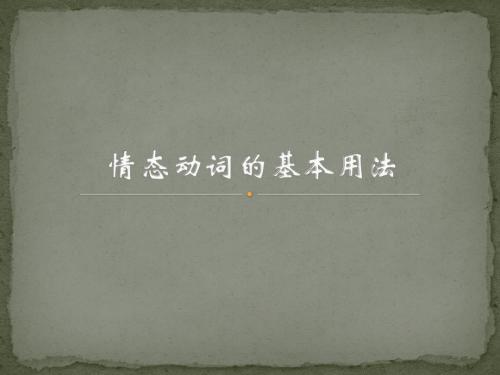(完整word版)初中英语情态动词的基本用法讲解
(完整word版)情态动词can(could),may(might)的用法

(一)can和could的用法1.表示能力或客观可能性,还可以表示请求和允许。
如:Can you finish this work tonight?你今晚能完成这项工作吗?Can you finish the work in such a short time你能在那么短的时间内完成这项工作吗?Man can not live without air.人离了空气不能活。
What can you do?你能干点什么呢?Can you pass me the books?你能给我递一下书吗?Could you help me,please?请问,你能帮助我吗?— Can I go now? — Yes,you can.—我现在可以走了吗?—你可以。
注意:①could也可表示请求,语气委婉,主要用于疑问句,不可用于肯定句,答语应用can(即could不能用于现在时态的简略答语中)。
如:Could I come to see you tomorrow?我明天能来看您吗?Yes,you can. (否定答语可用No,I'm afraid not.)是的,你可以。
(不,恐怕不行。
)②can表示能力时,还可用be able to代替。
如:I'll not be able to come this afternoon.我今下午不能来。
can 和could 只能用于现在式和过去式两种时态,将来时态用be able to 来表示。
He could help us at all.他完全可以帮助我们。
With the teacher's help,I shall be able to speak English correctly.由于老师的帮助,我将能准确地讲英语。
2. “can”表达推测例:Can the news be true? 这消息会是真的吗?The news can't be true. 这消息不会是真的吧。
情态动词的用法完整详细

情态动词定义:情态动词是一种本身有一定的词义,但要与动词原形一起使用,给谓语动词增添情态色彩,表示说话人对有关行为或事物的态度和看法,认为其可能、应该或必要等。
情态动词后面加动词原形。
分类:情态动词有四类:①只做情态动词:must,can(could),may(might),ought to②可做情态动词又可做实义动词:need,dare③可做情态动词又可做助动词:shall(should),will(would)④具有情态动词特征:have(had) to,used to位置:情态动词在句中放在谓语动词之前, 谓语动词前若有助动词,则在助动词之前,疑问句中, 情态动词则在主语之前。
I can see you. Come here.我能看见你,过来吧。
He must have been away.他一定走了。
What can I do for you?我能帮你吗?How dare you treat us like that!你怎能那样对待我们!特点:情态动词无人称和数的变化, 情态动词后面跟的动词需用原形,否定式构成是在情态动词后面加"not"。
个别情态动词有现在式和过去式两种形式, 过去式用来表达更加客气, 委婉的语气, 时态性不强, 可用于过去,现在或将来。
情态动词属非及物动词,故没有被动语态。
情态动词没有非谓语形式,即没有不定式,分词,等形式。
He could be here soon.他很快就来。
We can't carry the heavy box.我们搬不动那箱子。
I'm sorry I can't help you.对不起,我帮不上你。
基本助动词与情态助动词最主要的区别之一是,基本助动词本身没有词义,而情态助动词则有自己的词义,能表示说话人对有关动作或状态的看法,或表示主观设想:What have you been doing since? (构成完成进行体,本身无词义)I am afraid I must be going. (一定要)You may have read some account of the matter. (或许已经)除此之外,情态助动词还有如下词法和句法特征:1)除ought和used以外,其他情态动词后面只能接不带to的不定式。
初中英语情态动词讲解

情态动词(一)情态动词的定义: 情态动词表示说话人对某一动作或状态的态度。
(二)情态动词的特点1. 情态动词有一定的词义。
2. 情态动词不能单独做谓语,它必须和其他动词的原形一起构成谓语。
3. 情态动词没有人称,数的变化。
(三)情态动词的结构和意义1.情态动词的基本句型肯定句:主语+情态动词+动词原形+......否定句:主语+情态动词+not+动词原形+......疑问句:情态动词+主语+动词2. 情态动词的意义must“必须”;can/could“能,会”;may/might “可以”;should“应该”;would“愿,要”;have to“不得不”;need“需要”used to do 过去常常做.... Had better do sth 做好做某事(四)情态动词的基本用法1.can (could主要指过去时间)1)肯定句中,表示人或物本身所具有的能力,意为“能,能够,会” :Two eyes can see more than one. / I can swim very well.2)否定和疑问句中,表示可能(理论上或是逻辑判断,could 比can的可能性更小)He can’t (couldn’t) have enough money for a new car.Could it be Henry ?3)疑问中,表示请求、允许:(could表示比can的语气更委婉客气)--Can (Could) you lend me a hand? 帮我一把好吗?2. may (might)1)疑问句中,表允许,或者征求意见。
(might既指过去时间,也可指现在时间,语气比may更委婉)。
在回答May / (Might) /can ( could )I .....? 肯定回答一般用:yes ,you may /can , 或Yes, please. / Certainly./Sure./Of course. ;否定回答:用:No ,you may not / No ,you can’t / No ,you must not(mustn’t)(禁止)/ No, you had better not(最好别)2)肯定句中,may表可能, 但可能性不如can肯定,(might既可以指过去时间,也可以指现在时间,但语气上不如may 肯定)。
(完整word版)初中英语情态动词详细用法归纳(含练习及答案)(直接打印版),推荐文档

初中英语情态动词详细用法归纳(含练习及答案) (直接打印版)情态动词有具体的词义,但也同助动词一样,需要与其他词语一起构成句子的谓语,另外情态动词没有人称和数的变化,情态动词后必须跟动词原形。
1. can的用法:(1)•表示能力、许可、可能性。
表示能力时一般译为能、会”即有种能力,尤其是生来具备的能力,此时may和must均不可代替它。
如:She can swim fast, but lean 她能游得很快,但我不能。
I can see with my eyes.我用眼睛看。
(2)表示许可,常在口语中。
如:You can use my dictionary. 你可以用我的字典。
(3).表示推测,意为可能” 常用于否定句和疑问句中,此时can'译为"不可能”女口:Can the news be true?这个消息会是真的吗?一Can it be our teacher?那个人有可能是我们老师吗?一No, it can ' t be our teacher. He is on a visit tone Great Wall.不可能。
咱们老师正在游览长城呢。
【例题】一I think Miss Gao must be in the library. She said she would go there. —No. She __be there, I have just beenthere. A.can ' t B.mustn ' t C.needn ' t D.wouldn 't【解析】根据下文我刚去过那儿”可知,应为“不可能” can'表示推测[答案]A(1) .can的过去式,意为“能、会”表示过去的能力。
女口:He could write poems when he was 10. 他十岁时就会写诗。
(2) . could在疑问句中,表示委婉的语气,此时could没有过去式的意思。
情态动词的基本用法

1. can的基本用法: ⑴ 表示体力或智力上的能力,即“能够,会”,可与be able to转换。 例:He can speak English. = He is able to speak English. —Can you play basketball? — No, I can’t. 如果表示将来具备的能力,要用will be able to。 例:If I have a good sleep, I will be able to do the problem. ⑵ 表示许可,主要用于口语,书面语一般用may。 例:—Can we go home now, please? — No, you can’t. You can only smoke in this room. You can’t keep the library books for more than a month.
1. can的基本用法: ⑶ 表示“可能”,与may同义,但一般用在疑问句中。 例:What can he possibly want? 在否定句中,否定形式can’t表示推测“不大可能”。 例:Anybody can make mistakes. The news can’t be true. 与第一、二人称连用时,还可以就可能的解决问题的方式或可能的行为 提出建议。在这里,也可用could使语气婉转。 例:Can / Could we meet again next week? 下周我们可以再见面吗? —What shall we do? 我们怎么办呢? — We can / could try asking Lucy for help. ——我们可以请露茜帮忙试试 看。 You can / could help me with the cooking. 你可以帮我做饭。
常见情态动词讲解(可编辑修改word版)

常见情态动词讲解一、情态动词的定义:情态动词有词义,但它不能单独作谓语,它必须和其他动词一起构成谓语。
情态动词没有人称和数的变化;它的后面必须跟动词原形。
二、情态动词的种类:三、情态动词的用法及主要句型:1、Can I help you? ——Yes, please. / No, thanks.2、Can + 主语+ 动词原形? Yes, ~can. No, ~can’t.3、Can I borrow your book? --- Yes,of course.4、Can I write on the book? ------ No, you can’t\mustn’t.5、Could \Can you help me? ---- Yes,of course.\Certainly.\ Sure.6、Could \Can you tell me the way to the Zoo?7、May I come in ? ----- Come in, please.8、May I sit here? ---- Yes, please.\Sorry, please don’t.9、May I have some Coke? ---- Y es, of course.10、May/ Could / Can I speak to Tom? ----- Speaking. Who’s calling?11、should 、shouldn’t表示劝告:1)He should get up early.2)She shouldn’t play computer game too much.12、Should +主语+动词原形? Yes, ~should.\ No, ~shouldn’t.13、表示建议“你愿意…吗”---Would you like to go shopping with me?---Yes, I’d love to. /I’d love to. But I’m busy now.14、就餐用语Would you like something to eat\drink? ---- Y es, I’d like…15、shall 用于第一人称(I, we), 可以表示“将”和表示建议“……好吗?”1)Where shall we have dinner?2)Shall we go fishing? ----- A ll right. \OK. \Good idea.16、Must + 主语+ 动词原形? ---Yes,~must.\No, ~needn’t.四.常见情态动词的区别:1.can (could)1)表示能力,could 主要指过去时间。
初中英语:情态动词

初中英语:情态动词介绍:情态动词是英语中的一个重要语法点,它们可以用来表示可能性、必要性、责任、建议等等。
在英语口语中,情态动词的使用非常频繁,但是不同的情态动词的用法又各有不同,因此,我们有必要系统地学习情态动词的用法。
本文将为大家详细介绍情态动词的用法,并提供大量的练习题和答案,帮助大家掌握情态动词的用法,让你的英语口语更加流利。
一、情态动词的概念情态动词是指表示说话人对所说内容态度、说话人主观意愿、能力、建议、命令、禁止等的动词。
常用的情态动词有can、could、may、might、must、shall、should、will、would 等九个词。
二、情态动词的用法1.表示能力、许可、建议、命令、禁止等情况1) Can / CouldCan 表示现在或未来有能力做某事;Could 表示过去或未来有能力做某事,或表示委婉语气。
如:I can swim.(我会游泳。
)Could you open the window?(你能帮忙把窗户打开吗?)2) May / MightMay 表示有可能;Might 表示有可能性的弱化。
如:It may rain tomorrow.(明天可能会下雨。
)I might go to the party.(我可能去参加聚会。
)3) MustMust 表示必须,有义务或责任做某事。
如:You must wear a seat belt in the car.(在车上必须系安全带。
)I must finish my homework tonight.(我今晚必须完成作业。
)4) Shall / ShouldShall 表示说话人的意愿,用于提出建议或征求意见;Should 表示应该做某事,并且有义务去做。
如:Shall we go to the cinema tonight?(今晚我们去看电影好吗?)You should stop smoking.(你应该戒烟。
)5) Will / WouldWill 表示意愿、意图和承诺;Would 表示委婉请求和含蓄的建议。
(完整版)初中英语情态动词用法大全

情态动词用法归纳情态动词有can (could), may (might), must, have to, shall (should, will (would), dare (dared), need (needed), ought to等。
情态动词无人称和数的变化;不能单独使用,必须与其后的动词原形构成谓语一、can, could1) 表示能力(体力、知识、技能)。
Can you lift this heavy box?(体力)Mry can speak three languages.(知识)Can you skate?(技能)此时可用be able to代替。
Can只有一般现在时和一般过去式;而be able to则有更多的时态。
I’ll not be able to come this afternoon.当表示“经过努力才得以做成功某事”时应用be able to,不能用Can。
如:He was able to go to the party yesterday evening in spite of the heavy rain.2) 表示请求和允许。
-----Can I go now?----- Yes, you can. / No, you can’t.此时可与may互换。
在疑问句中还可用could,might代替,不是过去式,只是语气更委婉,不能用于肯定句和答语中。
---- Could I come to see you tomorrow?---- Yes, you can. ( No, I’m afraid not. )3) 表示客观可能性(客观原因形成的能力)。
They’ve changed the time table, so we can go by bus instead.This hall can hold 500 people at least.4) 表示推测(惊讶、怀疑、不相信的态度),用于疑问句、否定句和感叹句中。
- 1、下载文档前请自行甄别文档内容的完整性,平台不提供额外的编辑、内容补充、找答案等附加服务。
- 2、"仅部分预览"的文档,不可在线预览部分如存在完整性等问题,可反馈申请退款(可完整预览的文档不适用该条件!)。
- 3、如文档侵犯您的权益,请联系客服反馈,我们会尽快为您处理(人工客服工作时间:9:00-18:30)。
初中英语情态动词的基本用法讲解1.can (could)1)表示能力,could主要指过去时间。
Two eyes can see more than one. 两只眼比一只眼看得清。
Could the girl read before she went to school? 这女孩上学前能识字吗?2)表示可能(理论上或是逻辑判断上)。
The temperature can fall to –60℃, that is 60℃below freezing.气温可降至—60℃,也就是零下60℃。
He can’t (couldn’t) have enough money for a new car. 他不可能有足够的钱买新车。
You mustn't smoke while you're walking around in the wood. You could start a fire.在林子里走时勿吸烟,那样可能会引起火灾。
3)表示允许。
Can I have a look at your new pen? 我可以看一看你的新钢笔吗?He asked whether he could take the book out of the reading-room.他问他可不可以把书带出阅览室。
4)表惊异、怀疑、不相信等态度。
主要用于否定句、疑问句或感叹句中。
Where can (could) they have gone to? 他们会去哪儿了呢?He can’t (couldn’t) be over sixty. 他不可能超过六十岁。
How can you be so careless? 你怎么这么粗心?5)比较委婉客气地提出问题或陈述看法。
Can (Could) you lend me a hand? 帮我一把好吗?I’m afraid we couldn’t give you an answer today. 恐怕我们今天不能给你答复。
2.may (might)1)表允许,might可以指过去时间,也可指现在时间,语气更委婉。
You may take whatever you like. 你喜欢什么就拿什么。
He told me that I might smoke in the room. 他告诉我可以在房间里抽烟。
May (Might) I ask for a photo of your baby? 我可以要一张你宝宝的照片吗?在回答以may引起的问句时,多避免用这个词,而用其它方式,如Yes, please. / Certainly./ Please don’t ./ You’d better not. / No, you mustn’t.等,以免显得太严峻或不客气。
2)表可能(事实上)。
可以指过去时间,也可以指现在时间,但语气更加不肯定。
He may be at home. 他可能在家。
She may not know about it. 她可能不知道这件事。
He was afraid they might not agree with him. 他担心他们可能不同意他的意见。
They might be having a meeting, but I’m not sure. 他们有可能在开会,不过我不肯定。
3. must1)表示义务。
意为“必须”(主观意志)。
We must do everything step by step. 我们一切都必须循序渐进地做。
You mustn’t talk to her like that. 你不可能那样对她说话。
--Must we hand in our exercise—books now? 我们现在就要交练习本吗?--No, you needn’t. / No, you don’t have to. 不必。
(这种情况下,一般不用mustn’t)2)表示揣测。
意为“想必、准是、一定”等,只用于肯定句。
He must be ill. He looks so pale. 他准是病了。
他的脸色苍白。
She’s wearing a diamond necklace. She must have a lot of money. 她戴着钻石项链,一定很有钱。
4. shall1)表征询意见,用于第一、第三人称疑问句。
Shall I get you some tea? 我给你点茶好吗?Shall the boy wait outside? 让那男孩在外面等吗?What shall we do this evening? 我们今晚做什么?2)表说话人的意愿,有“命令、允诺、警告、决心”等意思,用于第二、第三人称陈述句。
You shall do as I say. 按我说的做。
(命令)You shall have my answer tomorrow. 你明天可以得到我的答复。
(允诺)He shall be sorry for it one day, I tell you. 有一天他会后悔的,我告诉你。
(警告)Nothing shall stop us from carrying out the plan. 什么也不能阻止我们执行这项计划。
(决心)5. will1)表意愿,用于各种人称陈述句。
I will do anything for you. 我愿为你做任何事。
None is so blind as those who won’t see. 不愿看的人眼最瞎。
If you will read the book, I’ll lend it to you. 如果你愿意读这本书,我会把它借给你。
2)表请求,用于疑问句。
Will you close the window? It’s a bit cold. 请你把窗户关上好吗?有点冷。
Won’t you drink some more coffee? 再来一点咖啡好吗?3)表示某种倾向或习惯性动作。
Fish will die out of water. 鱼离开水就不能活。
The door won’t open. 这门打不开。
The boy will sit there hour after hour looking at the traffic go by.那男孩常常坐在那里好几个钟点,看着车辆行人通过。
6. should1)表义务。
意为“应该”(某件事宜于做),用于各种人称。
You should be polite to your teachers. 你对老师应该有礼貌。
You shouldn’t waste any time. 你不应该浪费时间。
2)表推测,意为“想必一定、照说应该、估计”等。
The film should be very good as it is starring first-class actors.这部新电影是一流演员主演的,估计拍得很好。
They should be home by now. 照说他们现在应当已经到家了。
7.would1)表意愿。
They would not let him in because he was poorly dressed. 他们不让他进去因为他衣着破旧。
I said I would do anything for you. 我说过我愿意为你做任何事。
2)表委婉地提出请求、建议或看法。
Would you like another glass of beer? 再来杯啤酒好吗?Would you mind cleaning the window? 请把窗户擦一下好吗?They wouldn’t have anything against it. 他们不会有什么反对意见。
3)表过去反复发生的动作或过去的一种倾向。
Every time she was in trouble, she would go to him for help.她每遇到麻烦都会向她求助。
他告诉我盒子打不开了。
8. ought to1)表义务,意为“应该”(因责任、义务等该做),口气比should稍重。
You are his father. You ought to take care of him. 你是他父亲,应当管他。
You oughtn’t to smoke so much. 你不应该抽这么多烟。
2)表推测,暗含很大的可能,语气较弱。
Han Mei ought to know his telephone number. 韩梅该知道他的电话号码。
There’s a fine sunset; it ought to be a fine day tomorrow. 今天有晚霞,明天应该是个好天。
9. used to表示过去的习惯动作或状态,现在不复发生或存在。
疑问式和否定式有两种。
He used to live in the countryside, but now he lives in the city.他过去住在乡下,现在住在城里。
There used to be a building at the street corner, but it has been pulled down.街道拐角处过去有座楼房,现在拆了。
I usedn’t (didn’t use) to smoke. 我过去不抽烟。
Used you (Did you use) to go to school on foot? 你过去常步行去学校吗?。
